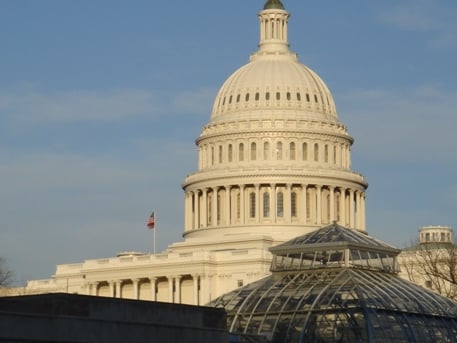Negative outlook sends stock markets tumbling; 'material risk' lawmakers won't agree on budget cuts
U.S. stocks slumped, sending benchmark indexes to their biggest declines in a month, after Standard & Poor's Ratings Service cut the nation's long-term credit outlook to negative.
Shares of companies most-tied to economic growth, including industrial, technology and commodity stocks, led the declines in the S&P 500. The Morgan Stanley Cyclical Index dropped 1.9 percent as 29 of its 30 stocks tumbled. Caterpillar Inc. and DuPont Co. sank at least 2.6 percent to help pace the declines in the Dow Jones Industrial Average. Exxon Mobil Corp. and Chevron Corp. dropped more than 1.4 percent amid concern that China's efforts to cool inflation will hurt economic growth.
The S&P 500 declined 1.5 percent to 1,300.21 at 12:12 p.m. in New York, its biggest drop since March 16. The Dow average tumbled 197.91 points, or 1.6 percent, to 12,143.92.
“There are a lot of structural issues that need to be dealt with,” said Mike Ryan, the New York-based chief investment strategist for Wealth Management Americas at UBS Financial Services Inc., which oversees $741 billion. “Anytime you see anything that suggests that the rating could be subject to downgrade, it's perceived negatively. If this were to raise funding costs for the government, then it would weigh on economic prospects. It's clearly not positive for companies.”
Stimulus Measures
The S&P 500 had rallied 4.9 percent this year through April 15 amid higher-than-estimated corporate earnings and government stimulus measures. The Fed and U.S. agencies have lent, spent or guaranteed about $8.2 trillion to lift the economy from the worst slump since the Great Depression, according to data compiled by Bloomberg.
S&P put a “negative” outlook on the U.S. AAA credit rating, assigning a one-in-three chance of a ratings cut in the next two years, because of rising budget deficits and debt.
“We believe there is a material risk that U.S. policy makers might not reach an agreement on how to address medium-and long-term budgetary challenges by 2013,” New York-based S&P said in a report today. “If an agreement is not reached and meaningful implementation does not begin by then, this would in our view render the U.S. fiscal profile meaningfully weaker than that of peer ‘AAA' sovereigns.”
Under President Barack Obama's fiscal year 2012 budget, released in February, the total debt subject to the ceiling would be $20.8 trillion in 2016. The plan House Republicans approved April 15, written by Budget Committee Chairman Paul Ryan, would need a debt ceiling of at least $19.5 trillion, according to data compiled by Bloomberg Government.
‘Fiscal Destiny'
“This is another indication of the need for the U.S. to better control its fiscal destiny, both for its sake and that of the global economy,” said Mohamed El-Erian, chief executive officer at Newport Beach, California-based Pacific Investment Management Co., the world's biggest manager of bond funds. “Absent credible medium-term fiscal reform, every segment of U.S. society would be faced with higher borrowing costs, a weaker dollar and a less bright outlook for employment, investment and growth.”
Caterpillar, the world's largest maker of construction equipment, had the biggest decline in the Dow average, dropping 3.9 percent to $103. DuPont slumped 2.6 percent to $53.49.
“It's ‘shoot first, ask questions later,'” said Eric Green, a money manager at Penn Capital Management in Philadelphia, which oversees $6.5 billion. “Debt-ceiling issues are clearly weighing on investor sentiment. It's questioning the integrity of the U.S. to pay their debts. If that were to occur, rates would go up pretty dramatically. That'd be a concern for investors.”
Energy Producers
Energy producers in the S&P 500 fell 1.7 percent as a group. Exxon slumped 1.5 percent to $83.07. Chevron declined 2.2 percent to $103.88. Oil fell for the first time in four days in New York after Saudi Arabia, the world's biggest exporter, said the global market has adequate crude supplies.
Gap Inc. slumped 3.6 percent to $21.66 after Goldman Sachs reduced its rating on the shares to “sell” from “neutral” and said it sees long-term declines in comparable-store sales. Bank of America Corp. also reduced its recommendation, cutting the shares to “neutral” from “buy.”
The MSCI All-Country World Index of shares in 45 countries tumbled 1.8 percent and the Thomson Reuters/Jefferies CRB Index of raw materials retreated 1 percent. Global stocks also slid as China increased banks' reserve requirements to lock up cash and cool inflation, and central bank Governor Zhou Xiaochuan said monetary tightening will continue for “some time.”
Reserve ratios will rise a half point from April 21, the People's Bank of China said on its website yesterday, pushing the requirement to a record 20.5 percent for the biggest lenders. The move came less than two weeks after an interest- rate increase. Zhou sees no “absolute” limit on how high reserve requirements can go, he said April 16.







